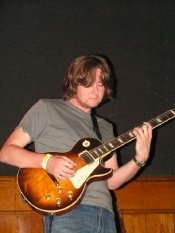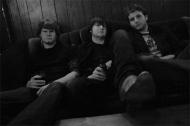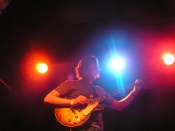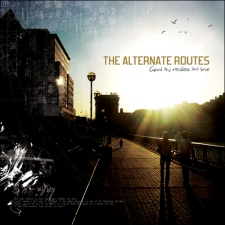|
Eric Donnelly |
|
|
It's not often to find someone who is actually doing what they were meant to do. Writing and performing in the Alternate Routes, Eric Donnelly is living life on his own terms. In early 2005, Donnelly and his band mates released their latest collection of songs titled, 'Good and Reckless and True,' and have been on the road making fans across the country ever since. Donnelly spent some time with Way Cool Music to discuss his love of guitar playing, guitar players and Punky Brewster. |
|
|
Way Cool: |
Tell us about your music background. |
| |
|
Eric Donnelly:
|
I’ve been playing guitar since I was really young. There were always instruments in the house, piano and guitars. I’ve always been a guitar player. I dabbled in piano a little bit for fun. I studied music at Fairfield University in Connecticut. That’s where I met Tim (Warren), the lead singer. We are both Fairfield U guys. I was a music major at Fairfield U. I was playing a lot of straight-ahead jazz at school. I came from a very musical house.
|
|
 |
|
WC: |
Were you in other bands before The Alternate Routes got together?
|
|
|
| ED: |
Yeah, I had a band in high school with a good friend of mine that I’ve kept in touch with. It was a really fun band because it was a rock band in the beginning, but when I got way into jazz, it became a jazz band and went back and forth. We’ve actually been using my friend from that first band as a second guitar in this band. It was a really cool experience to combine the first band I was in with this band. Like I said, when I was in college, I did a lot of freelance jazz stuff. I was doing a lot of random gigs with a bunch of different kinds of people. When I met Tim, we started The Alternate Routes and we’ve been going through different lineups since then. |
|
|
WC: |
How long have The Alternate Routes been together?
|
|
|
ED: |

|
|
3 years, I would say…it gets blurrier and blurrier. Tim was a freshman when I was a senior. I remember one day, we were hanging out at the Porch at Harborview in Bridgeport (Connecticut) where we live now and said, “Why don’t we start a band?" The thing we had in common was that we really liked to write songs. He’s a great singer, but he was never a diva about it. Writing songs was always the thing we’ve been interested in the most. |
|
|
WC: |
Are you doing music full-time now?
|
| |
|
| ED: |
I teach guitar in Connecticut, both at Fairfield U and privately. I really like teaching. I have a lot of different ages. I think my youngest is 6 and my oldest student is in his 40’s or 50’s. It’s fun to hang out with people to play and talk about guitar and music. I can see that, no matter what happens with this band or any other future project, I’ll always want to continue teaching. |
|
|
| |
|
WC: |
Was that the plan when you became a music major?
|
|
|
ED: |
No. I want to be a performer first. Performance is my favorite thing to do. But, I enjoy teaching as well. Performing and teaching are what I really enjoy.
|
|
|
WC: |
Do you have to make the choice?
|
|
|
ED: |
I’d love to not teach for a while and be on the road. Danny (Hest, manager) has us on the road with this record that I’m really proud of and we are going to be touring a ton. But, after that, some time in the future, I’ll go back. |
|
|
WC: |
How would you describe the band’s music to someone who has never heard it?
|
|
|
ED: |
It’s obviously got the singer/songwriter element to it. It’s got the acoustic guitar that puts it in a certain category. But, we never wanted it to be a “singer/songwriter” band. We wanted it to be a band that we liked, for example, The Band, U2 or The Beatles; bands that wrote songs together where the song was the most important thing. It’s a song-oriented band. |
|
|
WC: |
What is your creative role in the band?
|
|
|
ED: |
We all share a creative role. Since Tim and I have been playing together for the longest, we come up with a lot of different ideas. So, on any given song, I’ll come up with the guitar part or the music and we’ll work together to form it. It’s fun because even though Tim writes the lyrics, we all talk about every song. Ultimately, he’s the one who has to sing it. But, we always talk about the lyrics and what the song means. It’s nice to have lyrics match the music and have respect for both. To have the lyrics be as serious as the music or as light or whatever it should be. The creative role is simply coming up with music. |
|
|
WC: |
Your bio says you are a vocalist as well as guitarist. Is that correct?
|
|
|
ED: |
I don’t why it said vocalist. I had a brief stint with trying to do some different singing, but I’m not a very good singer. The only thing I did for the record was background vocals on ‘Are You Lonely?’ which is like a shouting background. You’ll never hear me call myself a vocalist. |
|
|
WC: |
Other than playing guitar, are there any other roles in the music industry that you’d like to pursue such as producing or engineering? |
| |
|
ED: |

|
|
No. To be honest, I’ve known from an early age that I’m not very good at much else. I like to play guitar. I like to teach guitar. I like to talk about guitar. Other than that, I’m not terribly technical with equipment; I break things easily. Chip (Johnson), the bass player, is great with the technical stuff. He has Pro Tools in his bedroom and can whip something up in 10 seconds. It’s all a mystery to me. I can only check my email. And working with Danny Hest has been a great opportunity. His job boggles my mind. He constantly has a vision and making things happen; I don’t have that skill either. Which is scary because that was my job before Danny was onboard because I am better than Tim at it. I don’t mean to play it down. I take a lot of pride in the band and the way it is run. I got into music to play and write and teach. The other sides of music I like to leave to other people, be it producing or promoting or whatever. I have the utmost respect for those who handle other aspects of the music business. |
|
|
|
WC: |
How did you hook up with Danny Hest?
|
|
|
ED: |
We met just about one year ago. Randomly one of his interns saw us at The Bitter End in New York and told him about us. I think, with Danny, is that we got along really well and respected each other. Danny has the vibe of an older brother and we trusted him pretty quickly. We couldn’t be happier so far.
|
|
|
WC: |
What has been the reception to the CD?
|
| |
|
ED:
|
Knock on wood, it’s been positive so far…at least that’s what they tell me. I think the most important thing, for us, is that we really like it. We cut two demos before that and we knew going into it, we didn’t have the money or time or songs. We worked really hard on them, but we didn’t have everything we needed. This is the first time that we are really proud of it. We know it’s not the best thing ever, the smartest record ever. But, whatever it is, we are really excited and proud of it. We learned from doing the first two records and this record is a product of what we’ve learned from those earlier experiences. After listening to this record for more months, I’m sure I’ll be sick of this. But, the best thing that I can say about this record is that we are really proud of it and proud to stand behind it. |
|

|
|
| |
|
WC: |
You recorded this new CD in Nashville, one of our favorite cities…tell us some highlights of recording there. |
|
|
ED: |
We were such dorks when we were there. We were there for three weeks and it was really hard to record that much material in that short a time. We were in the studio and then go back to the apartment after 10-11 hours in the studio and crash. We worked so much and when we weren’t working, we were exhausted. I wish we had some great stories. We like to go out as much as the next guys, but it was hard. |
|
|
WC: |
How prepared were you before heading into the studio? Were all the songs finished? |
|
|
ED: |
No. I think we had a really healthy mix of a lot of stuff we’d been working on for a while and some new stuff that was half written or sketches. Jay Joyce, our producer, was all about capturing a moment or a vibe. It’s a mentality I’ve adopted recently to not play so much, not think about things so much. He said, “Before you come to the studio, don’t play the songs that we are going to record for a while. Let them go for a few weeks.” You can’t really practice for what is going to happen in the studio because within one second it can all change. If you over think things, they can sound stale. |
|
|
WC: |
Who are your guitar influences?
|
| |
|
ED: |
 
|
|
I was a big Eric Clapton fan growing up. I was a Slash fan, from Guns and Roses…that’s why I play the Les Paul. I was also a huge Beatles fan growing up. In college, I studied jazz so my favorite jazz guys were Wes Montgomery, Kenny Burrell and Ernest Franklin. And, now I find myself listening to all of those guys and people like George Harrison. I absolutely love the way he plays. As you get older, you realize what he would do for a song; he was the vibe for all of those songs. You can sing every one of his solos. The older I get, the more I appreciate his style. It’s the same with Clapton, Slash, Wes Montgomery and Kenny Burrell. They are such melodic players who played within the song. You see really proficient players who can do a twenty-minute solo and play a million things. But, for me, my absolute favorite part of a song, for a guitar player, is when you can add something to a song, even if it’s a simple thing. That’s what I personally enjoy the most. Actually, the Edge, from U2, could be the quintessential melodic player. He’s not terribly flashy, but he carries the band. Robbie Robertson, from The Band, has his own stamp on everything he does. |
|
| WC: |
As an independent musician, how do you stay motivated? |
| |
|
| ED: |
I don’t have to think about it. I’m a kid in a candy store. Since we’ve met Danny and got to record in Nashville, it’s been great. It’s just so much fun to be out there playing. There are times when we get pissed off with each other, but that goes away in ten seconds. We are the farthest thing from jaded at this point. There were three years where we were playing the same 3 or 4 venues in the same 3 or 4 cities. We were struggling to get to the next level. It’s so exciting to be out and playing and the record is out so all we have to worry about is playing. There is no motivation necessary. |
|
|
WC: |
Where do you see yourself in five years? |
|
|
ED: |
Playing and writing. I would love to be at a level where people who like the music can see us. We were with Ari (Hest) in Columbus, Ohio on Monday night and there were maybe 50-100 people there who love his songs. It wasn’t Madison Square Garden, even though he has that capacity. It’s those nights where the audience is hanging onto every word. It doesn’t matter the size of the audience, as long as they are into it and we are into it, that’s what I find exciting. There’s something about going to a giant show, those aren’t terribly exciting. Like in Columbus, Ohio, it wasn’t a social event or a scene, just people who want to listen to music. That’s ultimately the goal, to play for an audience who are there for your music.
|
| |
|
WC: |
Where do you think the music industry is going to be like in 5 years?
|
| |
|
ED: |
You’re asking the wrong guy. I don’t know. I’m sure technology will play a part. I just got an iPod a few months ago so I’m behind the times.
|
| |
|
WC: |
What kinds of guitars make up your collection?
|
| |
|
ED: |
My collection is pretty small. I have a Les Paul. I have a Gibson 330 which is my favorite. I have a Gibson 175 which is a hollow body guitar. I don’t really don’t even own an acoustic guitar.
|
| |
|
WC: |
Now, we'd like to play a game we call "7 Questions." |
|
|
|
|
|
|

|
|
|
What's the worst job you've ever had?
|
|
That’s easy. I was an auditor for a company in Connecticut that would go to giant department stores when they were closed and count everything in the store. The worst was Home Depot. I had to go to Home Depot at 3am with a giant calculator from 1981 and count everything in the store for 8 bucks an hour. The nails and barbed wire cut my hands really bad. I did it during summer vacation during college. You didn’t have to go to Home Depot every time, sometimes you got to go to Toys R Us. But, Home Depot was the worst day of work. Their aisles are like 70 feet tall and 90 feet long.
|
| |
|
|
What's your favorite movie or lyric quote?
|
|
Are you saying my apples aren't what they ought to be? – Wizard of Oz |
| |
|
|
Who would you want to star in the movie of your life?
|
|
Oh no. That’s tough. I guess I would have to go with the actor, not because he looks like me, but because he’s my favorite character…Peter Krause. |
| |
|
|
What's your favorite TV theme song?
|
|
I can’t say it in public…the Punky Brewster theme song. Every time Tim and I have been out at a bar and we come home late at night and there are people around, we always play the Punky Brewster theme song. We both have sisters that were fans as kids. It’s a lovely song. |
| |
|
|
If you were a superhero, what would your name be?
|
|
I’m pretty tame so it wouldn’t be anything too exciting. I’ll copy Ari (aka Songboy) and be Guitarboy. |
| |
|
|
What do you want to do/be when you grow up?
|
|
Play guitar. |
| |
|
|
Finally, why are there so many songs about rainbows?
|
|
Because they are nice.
|
|
|
|
|
|
To find out more information about Eric Donnelly, visit his website at www.thealternateroutes.com. |
|
|